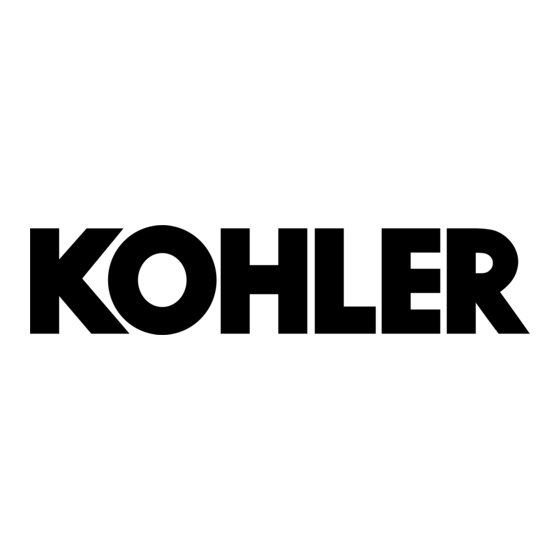Kohler AEGIS LH755 Manual del usuario - Página 10
Navegue en línea o descargue pdf Manual del usuario para Motor Kohler AEGIS LH755. Kohler AEGIS LH755 21 páginas. Kohler liquid-cooled horizontal crankshaft owner's manual

6. Apply a thin film of clean oil to the rubber gasket
on the new filter.
7. Install the new oil filter to the filter adapter. Hand
tighten the filter (clockwise) until the rubber
gasket contacts the adapter, then tighten the filter
an additional 3/4 to 1 turn.
8. Fill the crankcase with new oil of the proper type,
to the ''F'' mark on the dipstick. Refer to Oil Type
and Check Oil Level on pages 4 and 9. Always
check the level with the dipstick before adding
more oil.
9. Reinstall the oil fill cap and tighten securely by
turning to the right.
Oil Drain Plug
Figure 8. Oil Drain Plugs and Oil Filter.
Cooling System Maintenance and Service
Important service notes:
• Do not operate the engine without coolant in
the system.
• Do not remove the radiator cap when hot. Engine
coolant is hot and under pressure and can cause
severe burns.
• To prevent engine overheating and damage, use
the recommended anti-freeze mixture in the
cooling system.
• To prevent engine damage, do not pour cold
water into a hot engine.
• Cooling system capacity is approximately 2 L
(2.18 qt.).
10
Oil Filter
Oil Drain Plug
• To prevent engine damage, do not use anti-freeze
with stop-leak additive(s) or put other additives
in the cooling systems.
Maintenance
This engine is liquid-cooled, circulating a mixture of
ethylene glycol and water for dependable operation. A
pump is used to circulate the coolant through the
system and radiator. A thermostat contained in the
system assures automatic temperature control and
rapid warm-up. Maintaining the correct coolant level
and cleaning any debris accumulation from the inlet
screen and radiator surfaces are critical to ensuring
long life, proper system performance, and preventing
overheating. Check the coolant level in the overflow
reservoir, and clean away any debris accumulation
daily or before each use. At the same time, inspect the
hoses and all connections for signs of leakage.
Servicing
Engine coolant should be changed every 2 years or
every 1000 hours, whichever comes first. When
changing the engine coolant, the system should also
be flushed to remove any contaminants left behind
during draining. Following are recommended
procedures for checking, draining, flushing, and filling
the cooling system.
Checking Coolant Level
The coolant level should be checked at the overflow
reservoir, located within the formed supports of the
fan shroud. See Figure 9.
Figure 9. Overflow Reservoir Location.
1. Check the coolant level in the overflow reservoir.
Coolant level should be between the ''FULL'' and
''ADD'' marks on the reservoir. See Figure 10. Do
not operate the engine with the coolant level
below the ''ADD'' mark.
Add coolant to the overflow reservoir as
required. Use equal parts of ethylene glycol and
water only (distilled or deionized water is
recommended).
